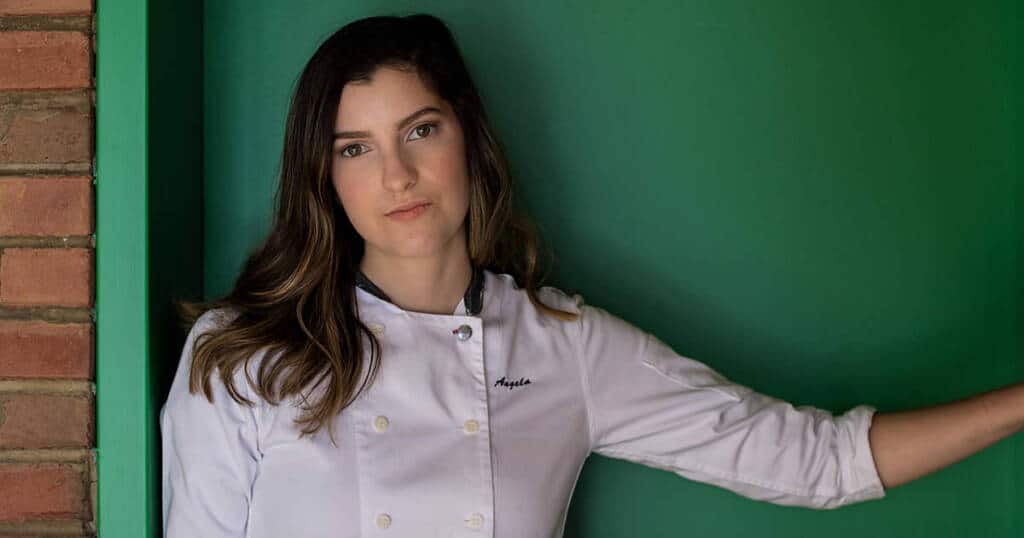
“I loved the smaller class sizes and student community at CIA. All of the one-on-one attention that students receive from chefs is indispensable, especially with the caliber of CIA faculty.”
CIA Alumni Bio
How did you become interested in food?
I can’t quite remember when I first fell in love with food, but if I had to guess, it would have a lot to do with my mom. My entire mother’s side of the family is Italian, so it goes without saying that I grew up in the kitchen. I was constantly helping my mom, begging to stay up late to watch Iron Chef America, and reading any cookbook I could get my hands on.
Do you already have a degree from another college or did you previously have a different career?
Yes. After high school, I initially was enrolled at the University of Michigan, following a pre-med academic track. I studied predominantly biology, organic chemistry, physics, Spanish, Italian, art history, and psychology.
Why did you choose the CIA?
In my second semester of college, I discovered the pastry chef Christina Tosi through the Momofuku Milk Bar cookbook, and her influence would prove to have a profound effect on my future. I felt deeply connected to her story: studying to become an electrical engineer to appease her parents, ultimately moving to New York City to pursue her true calling of becoming a pastry chef. She inspired me to take a leap of faith and follow my own culinary dreams by attending the CIA. I chose CIA over other culinary schools because of its distinguished faculty and vast alumni network, which includes my cousin, who I am very close with.
How have scholarships and/or grants helped you reach your goal of getting a CIA education?
CIA scholarships have helped me realize my goal of gaining a culinary education while relieving much of the financial burden, so that I can focus more on academics and extracurricular activities. I prioritize studying and preparing for classes over everything, so financial aid was a major factor in allowing me the time I needed to excel. My culinary scholarship through Stolt Sea Farm has also provided me the opportunity to travel abroad to Spain for two weeks to learn about sustainable aquaculture, a topic that I became fascinated with during my second semester at the CIA.

“My culinary scholarship through Stolt Sea Farm has also provided me the opportunity to travel abroad to Spain for two weeks to learn about sustainable aquaculture, a topic that I became fascinated with during my second semester at the CIA.”
What do you like best about the CIA?
I prefer more tight-knit working and learning environments where I can connect more with my teachers and peers, so I loved the smaller class sizes and student community at CIA. All of the one-on-one attention that students receive from chefs is indispensable, especially with the caliber of CIA faculty. During my time at CIA, I was constantly inspired by the diverse group of chefs and professors that instructed me and my class—not only because of their technical skills or knowledge, but because of their dedication to mentoring students. Without their encouragement and generosity, I would have missed out on many learning and networking opportunities.
Do you belong to any clubs or participate in any activities/sports on campus?
I have volunteered with the new student welcome team, as well as prepared food for charity dinners and campus events. Before my internship, I served on the executive board for SPICE, helping plan, organize, and supply food for events.
I have also been an orientation leader for over a year, and worked on campus as a line cook in the Apple Pie Bakery Café. In my spare time, I love to read, play guitar, and cook with my best friends.
What is your favorite dish to make?
I love making any kind of fresh pasta, for a variety of reasons. First, it connects me to my Italian heritage. I also love working with my hands and that the recipe is so simple, requiring you to rely more on experience and intuition. Making pasta is often a group activity, and I enjoy cooking most when I am surrounded by others who love cooking. Lastly, pasta is incredibly versatile and can be shaped, cut, and prepared in myriad different ways, perfectly simple or intricate and complex.
How has your CIA education prepared you for the business side of food?
Many CIA chefs have owned and run successful businesses, and they have shared many valuable lessons with students based on their successes and mistakes. The associate program has also provided students with the financial aspect of the food industry. Before attending CIA, I had no idea how to fill out a costing form, inventory sheet, or profit-and-loss statement, let alone an understanding of how vital they are to a self-sustaining business. Although I still have more to learn, I feel that I have a much better basis for studying food business further.
Obsessing over perfection is counter intuitive, and if you approach each task and situation with an open mind, you will learn more and perform better. It is important to be patient with yourself and not let ego or competitiveness distract you.
What are your career goals and how will your CIA education help you get there?
I plan on returning to the University of Michigan to complete my bachelor’s of science. Having concentrated on honing practical culinary skills for almost two years, I now have the inspiration and direction to help focus my studies further. I’m ready to delve into chemistry, biology, and physics to expand on the interests I’ve developed at culinary school, and to complement the technical knowledge that I have gained during the program.
In short, my long-term career goals are to own my own restaurant. I have not traveled nearly enough to decide where I want my restaurant to be, but for now I am thinking about staying in Michigan, where I was born and raised. I want my restaurant to focus on sustainable practices and educating the diners on how to make a significant impact on the environment through their food ways. Beyond just owning my own restaurant, I want to be involved in research that benefits the conservation of our resources and the environment. I want to combat the food deserts that affect so many native Detroiters, and help revive the city’s forgotten neighborhoods. I have always wanted to help others, regardless of my career path. I grew up learning about various global and local issues and wanting to be part of the solution. Although I am very academically inclined, I have found that nothing makes me happier than cooking and taking care of people, so my goal is now to use that passion to make a positive impact on others.
What advice would you give to a new student or someone who is considering attending the CIA
My advice would be to spend some time working in a foodservice environment before deciding to attend culinary school. As exciting as it can be to start college right away, it is a serious financial and time commitment, and working for a little while is a great way to make sure that it is the right choice for you. Although I grew up always loving cooking, I saw a completely different side of it when I first started working in a restaurant. The pace and mindset of the kitchen environment are completely different from cooking at home and on TV, and this definitely made a huge difference in preparing me for coming to the CIA.
Angela Peters is a recent CIA graduate who completed her associate degree in culinary arts at the college’s New York campus in Hyde Park. She is from Bloomfield Hills, MI.